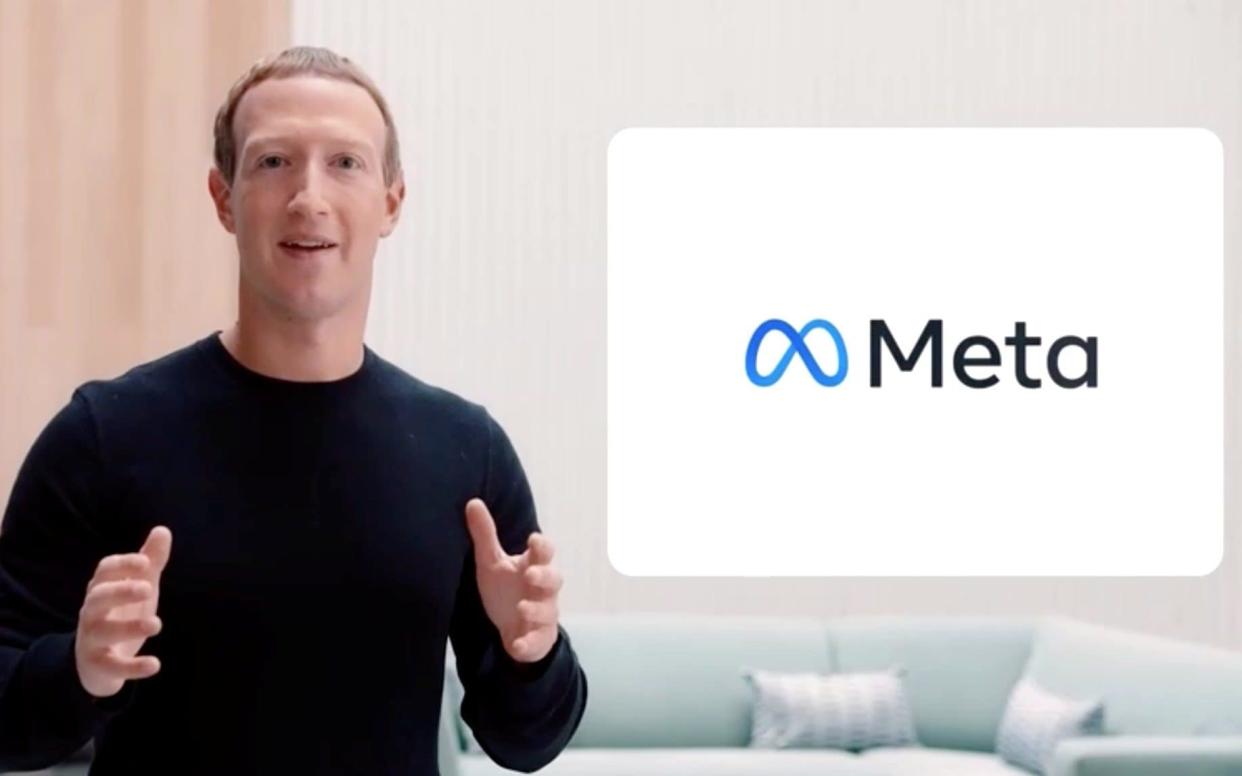Facebook changes its name to Meta

- Oops!Something went wrong.Please try again later.
Facebook will now be known as “Meta”, Mark Zuckerberg announced on Thursday as he tries to shift focus away from its controversial social network and on to its future technologies.
Speaking in a video on Facebook, the chief executive revealed details of the company’s “metaverse” project, an attempt to combine social media, video calls, gaming, entertainment and working from home into an immersive virtual reality world.
Mr Zuckerberg said: “From now on we are going to be metaverse-first, not Facebook first… I hope people around the world will come to know the Meta brand.
He added: “We believe the metaverse will be the successor to the mobile internet.”
The company will be reorganised into an overarching “Meta” business, with the Facebook app and Instagram split from its developing metaverse technology.
Mr Zuckerberg also said consumers would ultimately no longer need a Facebook account to access its product. That is a substantial shift away from the product that has made him one of the world’s richest people and pushed Facebook to a value of almost $1tn.
However, critics have accused Mr Zuckerberg of using the rebrand as an attempt to deflect from problems that exist on Facebook, such as hate speech and disinformation, and on to future products that may take years to come to fruition.
Leaked documents have revealed what Facebook knew about online harms on its apps, such as its impact on teenagers’ mental health. In Westminster, MPs accused the company on Thursday at a hearing of losing “sight of its moral compass in pursuit of billions of pounds”.
In his sweeping vision for Meta, Mr Zuckerberg said the metaverse would enable users to engage with the internet in “completely immersive ways. Instead of looking at a screen, you will be in these experiences,” he added.
In a swipe at Apple, Mr Zuckerberg claimed its “tightly controlled” app stores and “high taxes on creative ideas are stifling innovation”.
Apple’s App Store charges developers a fee of up to 30pc and has introduced privacy crackdowns that have affected Facebook’s advertising revenues.
Mr Zuckerberg admitted that his vision was about “five to ten years” away. The company relied on videos of concept products, games and simulations to show its plans. It also revealed some prototype products that included more realistic virtual reality.
The Facebook chief claimed users would be able to use the metaverse to “teleport” to friends’ houses or offices, use their thoughts to send text messages, or spend cryptocurrency. “With just a pair of glasses, you will be able to step beyond the physical world.”
Facebook has been attempting to launch virtual reality applications into the mainstream for years. It acquired virtual reality headset company Oculus in 2014 for $2bn. Mr Zuckerberg has promised to spend $10bn on its metaverse project.
Its latest products, such as the Oculus Quest, have greatly improved since then, but have only a tiny fraction of the users of its Facebook or Instagram apps. Facebook has also said it will launch smart glasses with Ray Ban in an effort to add “augmented reality” experiences, which feature virtual images across the real world. It also has a more advanced headset project called “Project Aria”.
Facebook’s shares rose about 3pc.
It is not the first Big Tech firm to attempt such a rebrand. Google changed its name and structure to Alphabet in 2015 but is still widely referred to as Google.

